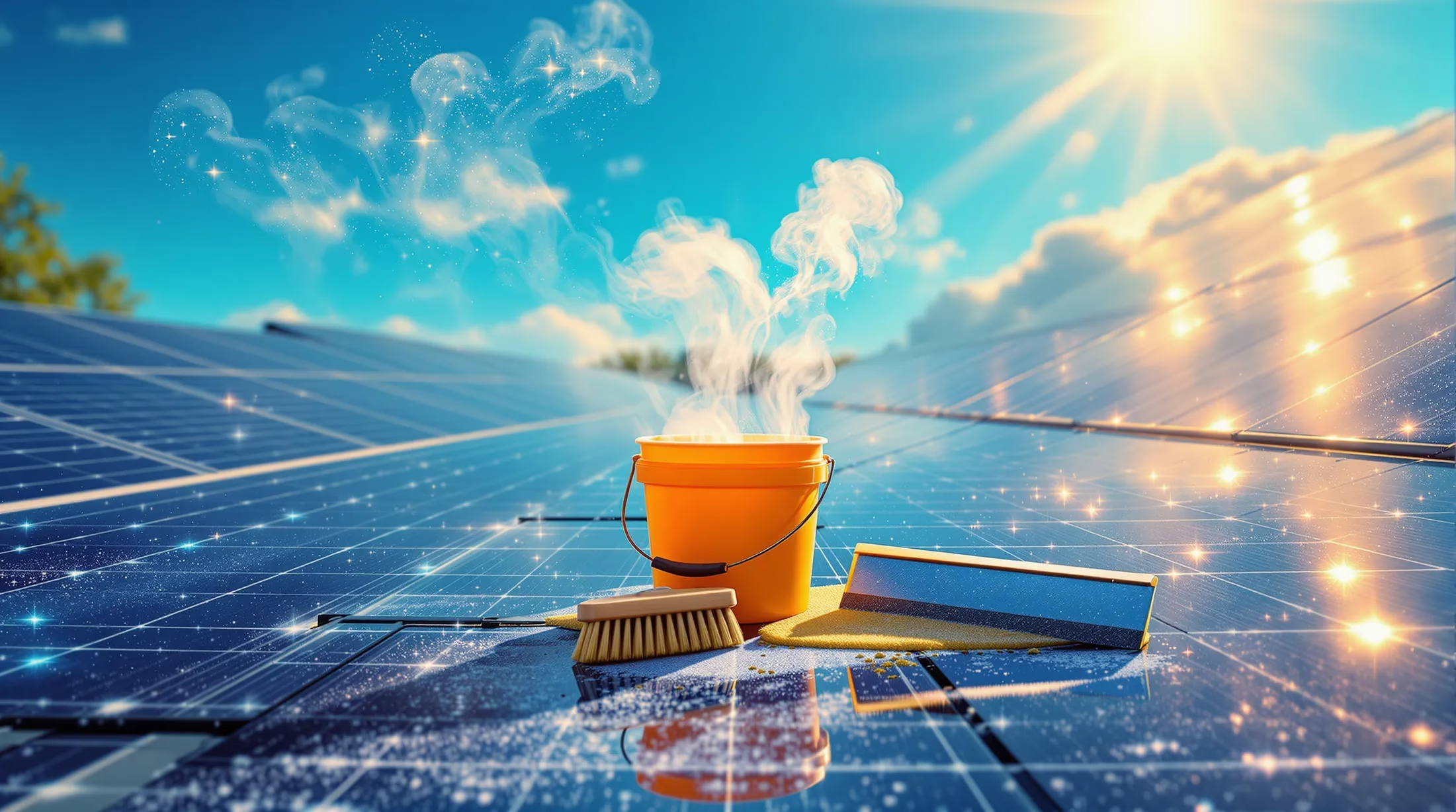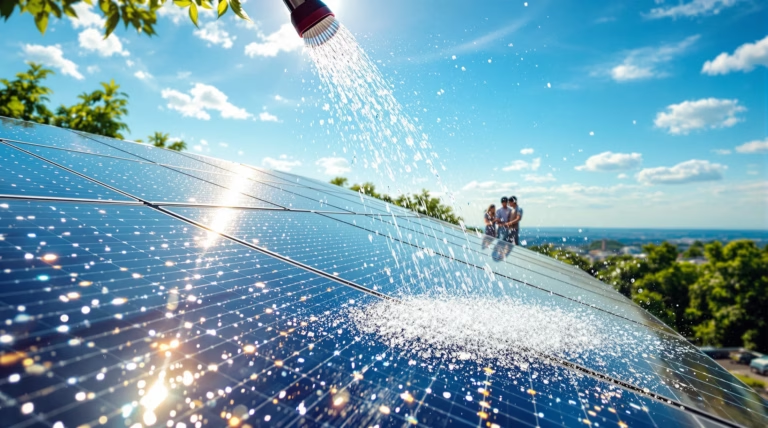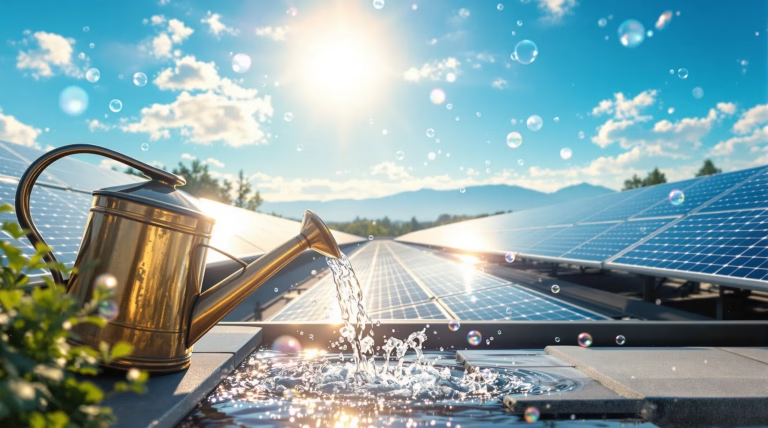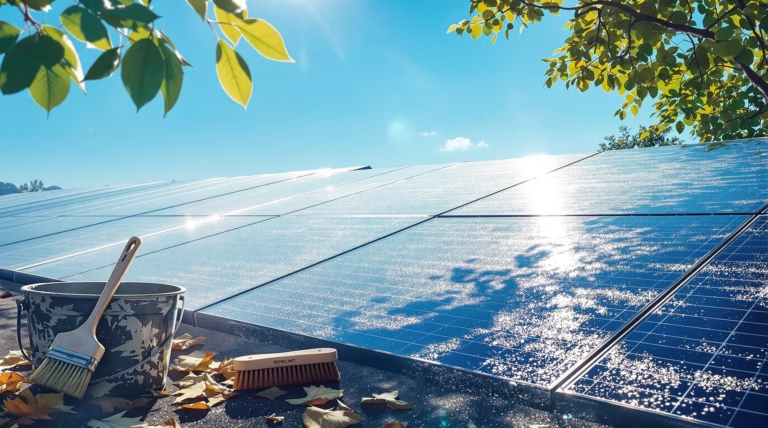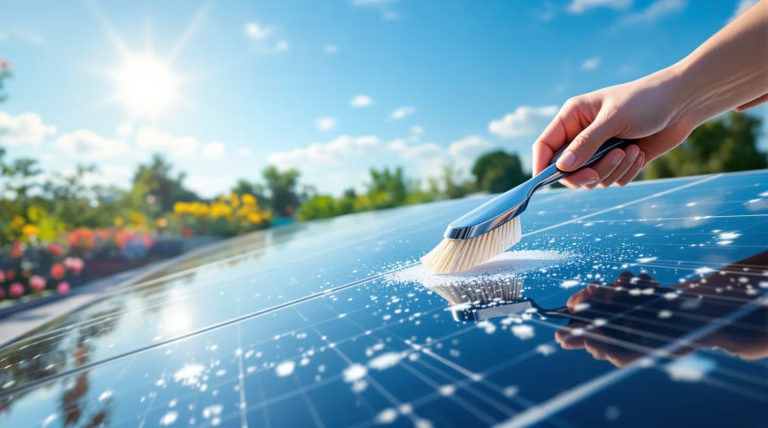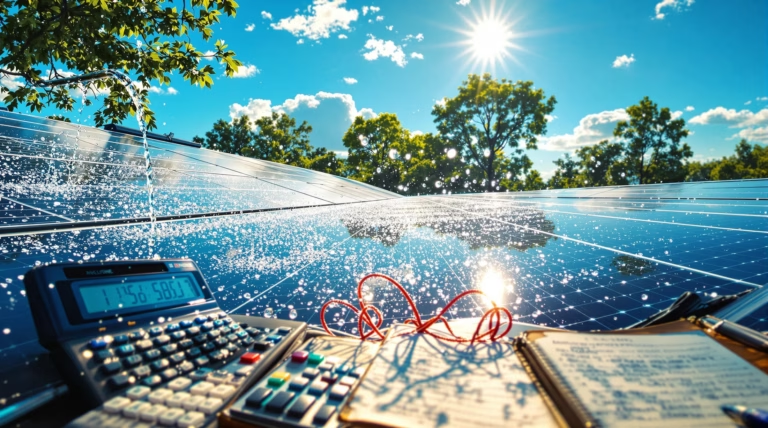How to Clean a Solar Panel: Step-by-Step Guide
Investing in solar panels is a significant step towards sustainable energy, but their effectiveness relies heavily on proper maintenance. Understanding how to clean and maintain your solar panels can significantly impact their performance and longevity. Let’s explore the essential aspects of solar panel cleaning and maintenance to help you maximize your investment.
Why Cleaning Solar Panels is Important
Solar panels represent a significant investment in sustainable energy, but their performance directly depends on their cleanliness. When dirt, dust, pollen, bird droppings, and other debris accumulate on your panels, they create a barrier that prevents sunlight from reaching the solar cells. This barrier can substantially reduce your system’s energy production – sometimes by up to 25% – effectively negating much of the financial and environmental benefits you installed them for.
Regular maintenance through cleaning ensures your solar panels operate at peak efficiency, maximizing your return on investment. Beyond the immediate performance benefits, consistent cleaning also helps extend the lifespan of your panels by preventing long-term damage from acidic substances in bird droppings or the abrasive effects of built-up grime.
Impact of Dirt and Debris on Solar Panel Efficiency
The accumulation of dirt and debris on solar panels creates more than just an aesthetic issue – it directly impacts their ability to generate electricity. Studies have shown that soiling can cause significant energy losses:
- Up to 7% annual energy loss in parts of the United States
- As high as 50% reduction in dustier regions like the Middle East
- 25% increase in energy production observed after first thorough cleaning
- Complete blockage in specific areas due to bird droppings and tree sap
- Uniform reduction across panels from dust and pollen accumulation
Benefits of Regular Solar Panel Cleaning
Regular maintenance delivers multiple advantages that extend beyond improved energy output:
- Maximizes sunlight absorption and electricity generation
- Reduces utility bills and increases energy company credits
- Prevents premature wear and tear from contaminants
- Extends operational lifespan of solar arrays
- Enables early detection of potential issues
When to Clean Your Solar Panels
Timing is crucial when it comes to cleaning your solar panels. The optimal time to perform this maintenance task is during the early morning or late evening when panels are cooler. This timing strategy prevents rapid evaporation of cleaning solutions and reduces safety hazards from handling hot surfaces.
Ideal Weather Conditions for Cleaning
| Condition | Recommendation |
|---|---|
| Best Time | Cool, overcast days |
| Alternative Times | Early morning before sunrise or evening after sunset |
| Avoid | Midday heat, especially during summer |
| Weather | Mild conditions without strong winds |
How Often Should You Clean Solar Panels?
The ideal cleaning frequency varies based on your location and environmental factors:
- Standard conditions: 1-2 times per year
- Drought-prone or dusty areas: quarterly cleaning
- Near industrial facilities: more frequent maintenance
- Properties with nearby trees: seasonal attention
- Performance monitoring: adjust schedule based on energy production data
Tools and Materials Needed for Cleaning Solar Panels
Properly cleaning your solar panels requires specific tools and materials to ensure effective maintenance without causing damage. While the essential equipment is relatively affordable, especially compared to professional cleaning services, using the right supplies protects your investment and maintains optimal energy production.
Before purchasing cleaning supplies, review your solar panel manufacturer’s maintenance guidelines, as specific recommendations or restrictions may apply. Following manufacturer specifications ensures your warranty remains valid throughout the maintenance process.
Essential Cleaning Tools for Solar Panels
- Soft bristle brush or non-abrasive sponge (vehicle-washing quality)
- Telescopic pole with adjustable length for roof access
- Squeegee with soft rubber blade for streak-free drying
- Garden hose with adjustable spray nozzle
- Microfiber cloths for spot cleaning
- Bucket for cleaning solution
- Safety equipment (rubber-soled shoes and work gloves)
Recommended Cleaning Solutions
| Solution Type | Ingredients | Best Use |
|---|---|---|
| Basic Clean | Deionized water only | Regular maintenance |
| Mild Solution | Water + non-abrasive dish soap | Standard cleaning |
| Enhanced Mix | 2 cups deionized water + ¼ cup white vinegar + 2 tbsp dish soap | Stubborn dirt removal |
Important: Never use abrasive powders, strong detergents, window cleaners with ammonia or alcohol, or high-pressure washers, as these can damage the protective coating on solar panels.
Step-by-Step Guide to Cleaning Solar Panels
The cleaning process requires attention to detail but remains manageable for most homeowners. Following a methodical approach ensures thorough cleaning while protecting your investment and personal safety.
Preparing Your Solar Panels for Cleaning
- Review warranty documentation for specific cleaning guidelines
- Schedule cleaning for early morning or evening when panels are cool
- Turn off the solar panel system following manufacturer instructions
- Conduct visual inspection from ground level
- Gather all cleaning supplies before starting
Cleaning Process: Step-by-Step Instructions
- Remove loose debris with a soft brush
- Prepare cleaning solution (¼ cup biodegradable dish soap to 2-3 gallons water)
- Apply solution using soft-bristle brush with extension pole
- Clean with gentle circular motions
- Rinse thoroughly with clean water
- Squeegee panels dry to prevent water spots
- Allow complete drying before system reactivation
Safety Tips for Cleaning Solar Panels
- Turn off the solar panel system following manufacturer’s shutdown procedure
- Clean from ground level using extension tools when possible
- Avoid walking on roofs to prevent damage and personal injury
- Use a sturdy ladder on firm, level ground with a spotter present
- Wear rubber-soled shoes for improved grip
- Use appropriate fall protection equipment when working at height
- Maintain safe distance when using water to prevent electrical hazards
- Avoid cleaning during adverse weather conditions
When to Consider Professional Solar Panel Cleaning
Professional cleaning services become particularly valuable in specific situations. These include properties in heavily polluted areas, coastal regions with salt spray exposure, or locations near deciduous trees that shed leaves and sap. When faced with stubborn residue like bird droppings that resist gentle cleaning methods, expert intervention becomes necessary. Additionally, those with mobility issues or concerns about working at heights should opt for professional services.
The location of your solar installation significantly influences this decision. Rooftop systems present considerable safety challenges, making professional cleaners with proper safety equipment and expertise the logical choice. Ground-mounted panels, however, typically allow for safer DIY maintenance. For optimal system performance, consider scheduling professional cleanings twice yearly – post-winter and late summer.
Advantages of Hiring Professional Cleaners
- Comprehensive safety equipment and expertise for high-risk installations
- Liability insurance coverage for peace of mind
- Specialized cleaning equipment designed for solar panels
- Expert identification of potential system issues
- Knowledge of manufacturer specifications and warranty requirements
- Professional assessment of storm damage and debris removal
Cost Considerations for Professional Cleaning
| Service Aspect | Details |
|---|---|
| Average Cost Range | $100-$300 for typical residential installation |
| Efficiency Improvement | 15-25% for heavily soiled panels |
| Cost Factors | System size, panel accessibility, geographic location |
When selecting a cleaning service, prioritize companies with proven experience and positive reviews in solar panel maintenance. Request detailed quotes from multiple providers, comparing their cleaning processes, products used, and insurance coverage. While cost matters, choosing the cheapest option may lead to improper cleaning techniques and potential panel damage. For ground-mounted systems, professional cleaning might be unnecessary unless physical limitations prevent DIY maintenance.

